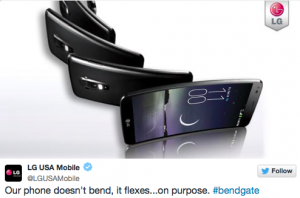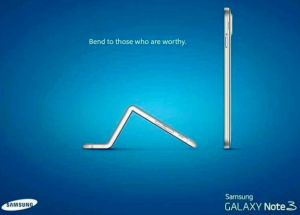Soon after releasing its latest device, the Iphone 6 Plus, Apple received complaints concerning users’ Iphone being deformed in their pockets, creating a “bendgate” polemic.
Photos and videos have gone viral, greatly affecting Apple’s image. With Apple’s “14 days return policy”, customers may opt to return their recently-bought Iphone to avoid facing this issue in the future. Consequently, not only will Apple’s sales decline, but they will also end up with a stock of bent Iphones that cannot be resold.

In addition, major competitors, namely Samsung and LG, took this opportunity of “repositioning the competition” (as Ries and Trout mention in their book, “Positioning, a battle for your mind”), in their adverts by mocking Apple’s “bendgate”.
According to me, some users may have exaggerated on the “bendgate”, by purposely bending the phone to prove its malfunction. “The amount of force required, 90 to 110 pounds (…) is not something that is likely to happen in everyday life” Apple debates.
As loyal customers tend to overlook some cases, i assume that most of them will keep purchasing at Apple, one of the leaders of smartphones. This demonstrates Apple’s position in the market.
To respond to this issue, Apple explains that with the normal use of the phone, a bend is very rare. Yet, it is not impossible. So, even though Apple is trying to justify itself, i would encourage the firm to invest further in R&D. A redesign of the Iphone that meets customers’ expectation might overwrite Apple’s “bendgate” criticism.
Image sources:
https://twitter.com/LGUSAMobile/status/514817371911901184/photo/1
http://s3.amazonaws.com/digitaltrends-uploads-prod/2014/09/Galaxy-Note-4-Bendgate.jpg

